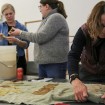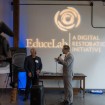UK at the Half: AI reads text from 2,000-year-old Herculaneum scrolls
In this “UK at the Half,” a University of Kentucky professor helps unlock ancient secrets — putting the university in the national and international spotlight.
The Herculaneum scrolls are among the most iconic and inaccessible of the world’s vast collection of damaged manuscripts.
Since being burned and carbonized by the catastrophic eruption of Mt. Vesuvius in 79 C.E., they’ve been deemed “unreadable.”
For more than 2,000 years, wisdom from the only library to survive from ancient times remained locked away.
Until now.
For the last 20 years, Brent Seales, a computer science professor in the Stanley and Karen Pigman College of Engineering, has been working on an artificial intelligence (AI) program to virtually unwrap and read these unopenable scrolls.
“Virtual unwrapping was born from a vision that I had where we might be able to explore the interior of something without ever having to physically open it,” Seales said. “How to do that was really a software problem.”
Seales and his team built a revolutionary computer program — the Volume Cartographer — for locating and mapping 2D surfaces within a 3D object. The software pipeline is used with micro-CT to generate extremely high-resolution images — enabling the ability to read a document without ever needing to physically open it.
But challenges remained, and the long and arduous journey to read the Herculaneum scrolls continued.
Fast forward, in March, Seales — along with Silicon Valley investors Nat Friedman (instigator and sponsor), Daniel Gross (sponsor) and JP Posma (project lead) — began leading a global competition to read the charred scrolls after he demonstrated an AI program can successfully extract letters and symbols from X-ray images of the unrolled papyri.
As part of the Vesuvius Challenge, Seales’ team released its software and thousands of 3D X-ray images of two rolled-up scrolls and three papyrus fragments.
The hope was, and still is, that $1 million in prizes would encourage global researchers and scholars to build upon the AI technology and accelerate the decoding.
Teams that enter the challenge are competing for a grand prize of $700,000 — awarded to the first to read four passages of text from the inner layers of the scrolls by the end of 2023. Progress prizes include $50,000 for accurately detecting ink on the papyri from the 3D X-ray scans.
Now, six months since the competition began, the Greek characters, πορφύραc, revealed as meaning "purple dye" or "clothes of purple," are among the multiple characters and lines of text that have been extracted by Vesuvius Challenge contestants Luke Farritor and Youssef Nader.
With the competition still underway, and the $700,000 prize still up for grabs, the team has launched a large-scale effort to read every unopened papyrus scroll in the collection, which includes more than 600 rolled scrolls that remain sealed and unreadable.
All winning submissions have been made open source, so future contestants can use the body of work as a starting point.
Seales believes reading the entire collection of Herculaneum scrolls is not only possible, but will be the largest discovery from the ancient world to date.
“We have pursued the dream of reading this extremely challenging material from Herculaneum. We have now proven that it is possible. There is a huge emotional component, which is powerful and inspiring,” he said. “Overcoming damage incurred during a 2,000-year span is no small challenge. But that’s what researchers do — together, we conquer the seemingly impossible."
You can read more about the discovery and the contest here.
"UK at the Half" airs during halftime of each UK football and basketball game broadcast on radio and is hosted by UK Public Relations and Marketing. To hear the "UK at the Half" interview, click on the play button above.


